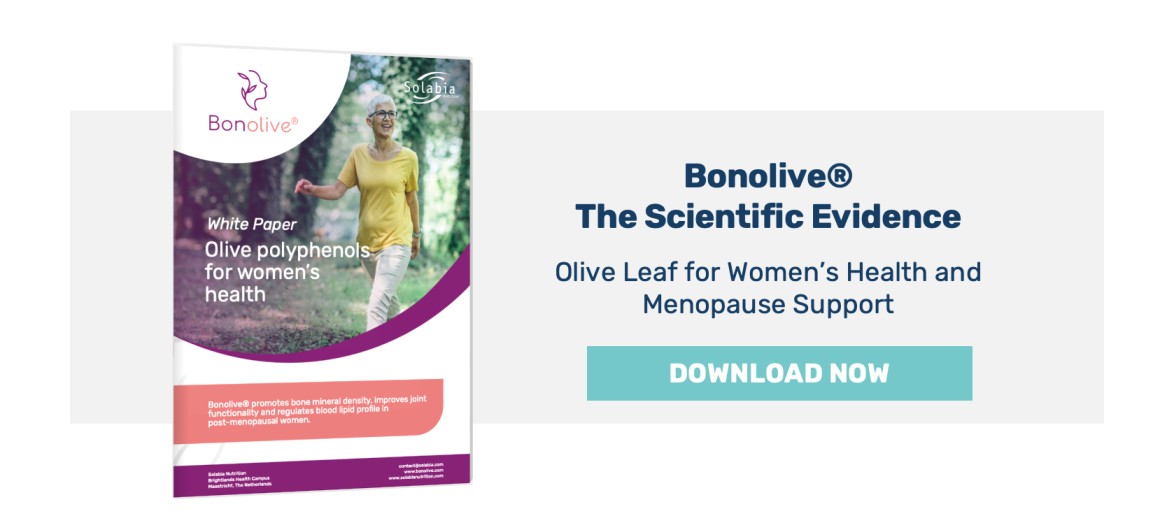Improving bone health during menopause with Bonolive®
Last updated: May 31st, 2024
February 3rd, 2022
The menopause transition is a critical period for bone health in women. More than ever, to address this key health concern, consumers are shifting away from calcium-only products and seeking out more complex formulas with clinically-backed ingredients.
Bonolive® is a patented ingredient rich in olive polyphenols that offers the possibility of formulating innovative bone health solutions tailored to women to counteract bone loss risk associated with menopause.

What happens to bone health during menopause transition?
Healthy bones are needed to support our body, providing structure, and allowing us to move and protect our organs. They also store essential minerals, such as calcium and phosphorus, and release them into the blood whenever needed.
Bone health depends on a dynamic equilibrium between the constant production of the new bone matrix via osteoblasts, the cells responsible for bone synthesis, and the resorption of old bone by osteoclast, the cells responsible for bone breakdown.
There are a lot of symptoms related to menopause, but did you know that the menopause transition is the most critical period for bone health in women? That is because the fine equilibrium between bone breakdown and synthesis is broken due to hormonal changes.
The onset of the rapid bone loss phase is due to the drastic drop in estrogen levels, which play an important role in maintaining bone strength. This can result in bone resorption exceeding bone formation, leading to thin, fragile bones subject to spontaneous fracture.
Rapid losses in bone mass and strength usually occur in the 3-year window since the date of the final menstrual period [1].
Decreased levels of estrogen cause osteoprotegerin levels to decline. Osteoprotegerin is a protein secreted by osteoblasts, which antagonises the process of bone breakdown mediated by osteoclasts.
Therefore, with the lowered estrogen levels associated with menopausal changes, osteoclast activity increases leading to decreased bone mass and, in many cases, osteoporosis. This results in reduced bone strength and increased risk of fractures.
Although it is essential to build strong and healthy bones during the early stages of our lives, there are also important factors to take care of during adulthood, particularly during menopause, such as sufficient physical activity, proper nutrition and supplementation.
How is bone health managed traditionally?
With the world population getting older, bone health issues are increasing. In postmenopausal women, the prevalence of osteoporosis and osteopenia is estimated to be almost 20% and 52%, respectively [2].
Bone health is indeed a key concern for this vulnerable group. This reflects that 25% of women who use dietary supplements are already consuming products to support their bones and different ingredients can be consumed to support bone health.
Over the last decade, exercise and calcium and vitamin D supplements have been the most used measure for preventing bone loss during menopause.
It is known that a sufficient calcium intake increases bone density and vitamin D is crucial for bone health because it plays a crucial role in calcium absorption [3].
While this strategy has proven marginal improvements, consumers are becoming more demanding. In fact, the popularity of innovative, nutraceuticals with a clinical backup addressing bone health is growing [4].
Scientific evidence has shown that bone physiology can be modulated by phenolic compounds found in olives [5].
These powerful antioxidant compounds can indeed stimulate markers involved in osteoblast proliferation, differentiation, and maturation. This ultimately leads to a counteracting effect against bone loss risk.
What is Bonolive® and how does it support healthy bones?
Bonolive® is a patented, olive-polyphenol-based ingredient researched and developed by Solabia Nutrition (previously known as BioActor), with demonstrated efficacy in increasing bone formation in postmenopausal women.
Bonolive® is standardised for highly bioavailable oleuropein, the powerful phytonutrient deemed responsible for the increase in the number and activity of osteoblasts observed during Solabia Nutrition’s research.
The randomised, double-blind clinical trial demonstrated that an intake of 250mg/day of Bonolive® is sufficient to re-balance the bone turnover [6].
Additionally, after 12 months, a 32% increase in osteocalcin was observed in the treatment group, compared to a 6% decrease in the placebo group.
Osteocalcin is a key component for building new bone, as it forms the scaffold for new bone tissue and binds calcium within a rigid structure.
The increase in osteocalcin is also reflected by the DEXA scan results, which show that subjects taking Bonolive®, displayed protection of bone mineral density at the lumbar spine and a higher gain of bone mineral density at the femur neck, compared to those taking placebo.
What are the opportunities for new product development with Bonolive®?
As consumers are shifting away from calcium-only products and seek out more complex formulas with clinically-backed ingredients, Bonolive® offers the possibility of developing innovative consumer products specifically crafted to help women support healthy bones during menopause.
For a synergistic effect, Bonolive® can be successfully combined with calcium, vitamin D and magnesium, as well as other vitamins, minerals and plant extracts.
This Mediterranean-inspired ingredient can be easily included in various dietary supplements, functional drinks and foods, with a daily dose of only 250mg.
Apart from innovative blends, further product development opportunities in this growing market lie in convenient formats like gummies and ready-to-drink beverages.



